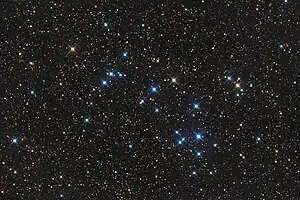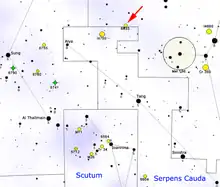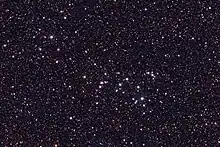NGC 6633
NGC 6633 is a large bright open cluster in the constellation Ophiuchus. Discovered in 1745-46 by Philippe Loys de Chéseaux, it was independently rediscovered by Caroline Herschel in 1783 and included in her brother William's catalog as H VIII.72.[1] Bright enough to be seen with the naked eye, the cluster is considered a fine object for binoculars or small telescopes.[2]
| NGC 6633 | |
|---|---|
 Open cluster NGC 6633 | |
| Observation data (J2000.0 epoch) | |
| Right ascension | 18h 27.7m |
| Declination | 6° 34′ |
| Distance | 1.04 kly |
| Apparent magnitude (V) | 4.6 |
| Apparent dimensions (V) | 27′ |
| Physical characteristics | |
| Estimated age | 660 million years |
| Other designations | NGC 6633, De Cheseaux No. 3 H VIII.72, Cr 380, Mel 201 |
| Associations | |
| Constellation | Ophiuchus |
NGC 6633 is also known as the Tweedledum Cluster (paired with IC 4756 as Tweedledee), also as the Captain Hook Cluster.[3] It is also designated Collinder 380 or Melotte 201. Nearly as large as the full moon, the cluster contains 38 known stars[4] and shines with a total magnitude of 4.6; the brightest star is of mag 7.6. Its age has been estimated at 660 million years.[1]
The cluster contains at least one chemically peculiar star - NGC 6633 48 (BD+06 3755).[4]
The 8th-magnitude binary star HD 169959 (NGC 6633 58) is within the line-of-sight of the open cluster but is not physically associated with it.[4]

References
- "NGC 6633". messier.seds.org. Retrieved 2020-10-05.
- Michael Bakich. "Open cluster NGC 6633, a complex of dark nebulae, and globular cluster M54". astronomy.com. Retrieved 2020-10-05.
- O'Meara, Stephen James (2007). Deep-Sky Companions: Hidden Treasures. Cambridge University Press. pp. 457–458. ISBN 978-0521-83704-0.
- Paunzen, E.; Netopil, M.; Maitzen, H. M.; Pavlovski, K.; Schnell, A.; Zejda, M. (2014), "Photoelectric search for peculiar stars in open clusters", Astronomy & Astrophysics, 564: A42, arXiv:1403.3538, doi:10.1051/0004-6361/201423521, S2CID 119174151
External links
 Media related to NGC 6633 at Wikimedia Commons
Media related to NGC 6633 at Wikimedia Commons- NGC 6633 on WikiSky: DSS2, SDSS, GALEX, IRAS, Hydrogen α, X-Ray, Astrophoto, Sky Map, Articles and images
